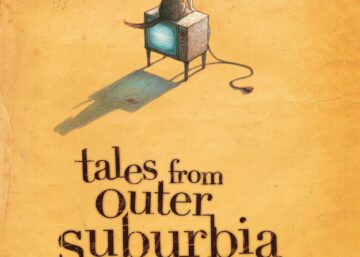Some books really seem to narrow the gap between short stories, novellas, and novels. Take George Saunders’ Tenth of December, the off-kilter dystopian world these short stories are set in give it a combined narrative that makes it seem very much in novel territory. And The Bone Clocks (like Cloud Atlas), is almost like a series of novellas with some character overlap. There is a thin line between the form of Tenth of December and The Bone Clocks. And as is often the case with short story books, I had very different reactions to each of these stories.
The first story in The Bone Clocks introduces us to Holly who is the common thread throughout all the stories. It’s a relatively straight-laced introduction that has much in common with Mitchell’s nostalgic eighties-twinged coming-of-age novel Black Swan Green, and I’m a total sucker for that whole that bag of tricks.
As Holly gets older, we’re introduced to new characters in her life. One section is about a posh con boy she has a fling with. Next we meet her husband, a war junky journalist. Ok – so far so good. And then not:
Next up is a very long section featuring an old whinge-bag novelist which I could not wait to end. It was only towards the end that I recognised the audiobook narrator of this section. I looked him up, and indeed, he narrated The 100-Year-Old Man Who Climbed Out the Window and To Say Nothing of the Dog. I pretty much hated both of those books. I find his style of narration incredibly irritating and it’s only in retrospect that I realise my great dislike of these books probably had more to do with the narrator than the writing, particularly as I so suddenly hated this chapter compared to the others. That’s interesting. I didn’t realise a narrator could sway a book that much. On top of that, this section has no great relevance to the overall story. It could be very easily skipped.
Ok annoying narrator out of the way. What’s next? Oh great. Full on, up-to-eleven, fantasy mode. Sigh. My eyes glaze over when I hear too many gobbledy-gook made-up words. And then made worse by borrowing from a new age supernatural world of woo that I can’t abide. Check out this guff: “Darnock shuts his eyes, opens his chakra eye and channels the ember red light of the shaded way at the throat of the holy of holies. The Blind Cathar is no longer dreaming.” This section was drenched in this psychobabble, and halfway through, I realised I hadn’t the slightest clue what was going on. And had to go back to the start and make an extra effort pay attention. And lost the will to live by the end of it.
Alas, I really enjoyed the final chapter, set in a post-apocalyptic rural Ireland. And no new age fantasy guff. So it was great to end on a good note, and as a whole, my overall experience was nudged into thinking this was a great 4-star read. There were a few VERY dodgy bits for me, but overall, Mitchell is still a very reliable read.


